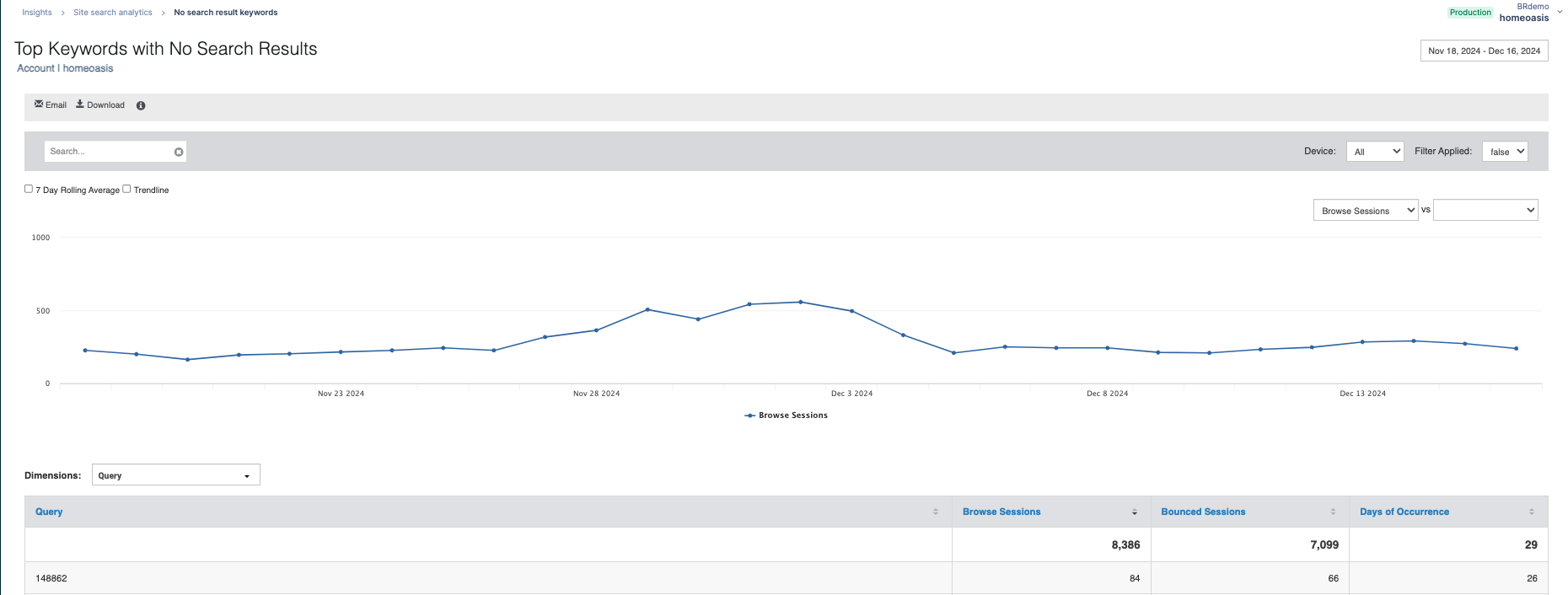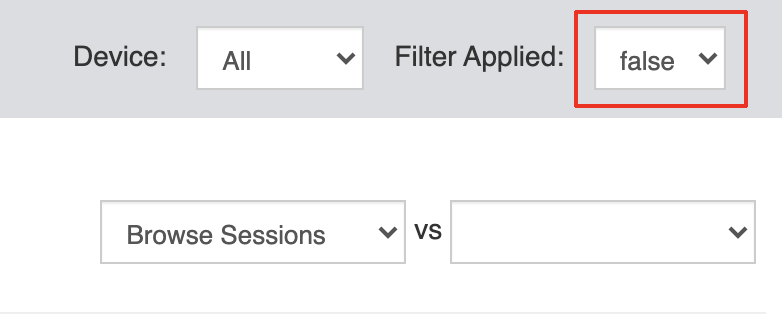Site search reports
Each site search report can be used for various purposes. For example, the No Search Result Keywords report helps you discover the query keywords that return no product results on your site. Showing no results for a query leads to a bad end-user experience and usually causes your end-users to leave the site as no results are shown for the keywords they are searching. Providing insights for such keywords can help site search optimizers optimize (by adding synonyms, rules, etc.), resulting in pages for such queries, and can considerably improve the end-user experience.
Note
The reports by default provide keywords searched on the site for the last 30 days. During that duration, it might be possible that for some of the keywords, the search results may have been automatically optimized via Bloomreach Search or may have been manually updated.
Viewing the reports
To view full and detailed reports for Search:
- In your Bloomreach dashboard, go to Insights -> Site search analytics -> Analytics report.
- Click on a report link from the navigation. The analytics page opens as shown below:

Report filters
You can apply different filters to the data. Select a filter type from the Device, Filter Applied, and so on dropdown menus on the right (each report has different filters available).

These are the meanings of the options available for the Filter Applied menu (whether a filter was applied to the search query):
- False (default value) – Returns search results where no filter has been applied to the search category.
- True – Returns search results where one or more filters have been applied to the search category.
- All – Returns search results with or without filters applied.
Report metrics
Dimensions
- Query: The exact query that the user searched on the site.
- Device Type: The Device on which the query is made. Possible values: Mobile, Desktop, Tablet, Other, Unknown.
- Domain Key: The domain key for the merchant.
- View ID: The View ID for the merchant in case multiple site views are configured on the site.
- Channel: The source (channel) through which a user came to the site before the query was made. Possible values: Paid Search, Organic Search, Social, Direct, Navigation, Other, and Unknown.
- Date / Month / Year: Allows users to view query keywords and other metrics date-wise.
Session Metrics
- Browse Sessions: The browse sessions metric in a report is the number of search sessions for the given keywords, i.e., the number of times the keyword is searched on the site.
- Bounced Sessions: The bounced session for a search query is the session with no product views.
- Days of Occurrence: The days of occurrence provide information regarding the days in the selected time period when the query keyword is searched on the site.
Viewing and Comparing Metrics
You can view the trends in the graphical form using any provided metrics: Browse Sessions or Bounced Sessions. You can also compare the data in the graph by selecting Browse Sessions vs Bounced Sessions and vice versa. Use the drop-down option on the top right-hand to select metrics to view and compare. A snapshot of this option is given below:

Report Actions
There are two ways to receive reports for your site:
- Email: To receive a report via email, click the Email icon at the top left corner of the report.
- Download: To download a report directly to your system, click on the Download button on the top left corner of the report.

- 7-Day Rolling Average: Selecting this option shows the graph plotted by taking the arithmetic mean for a selected metric over a 7-day period.
- Trendline: Selecting this option shows the general pattern for the metrics in the graph.
Zero Search Result Optimizations
Bloomreach optimizes search results dynamically to avoid null results being shown to your customers. So you might notice keywords that do return results although it is appearing in the No Search Result Keywords report. This is due to any of the following optimizations:
- Synonyms: This report by default provides keywords searched on the merchant site for the last 30 days. In this duration, it might be possible that for some of the keywords, the search results may have been automatically optimized via Bloomreach Synonyms or may have been manually updated to the Synonyms list.
Updated 3 days ago
